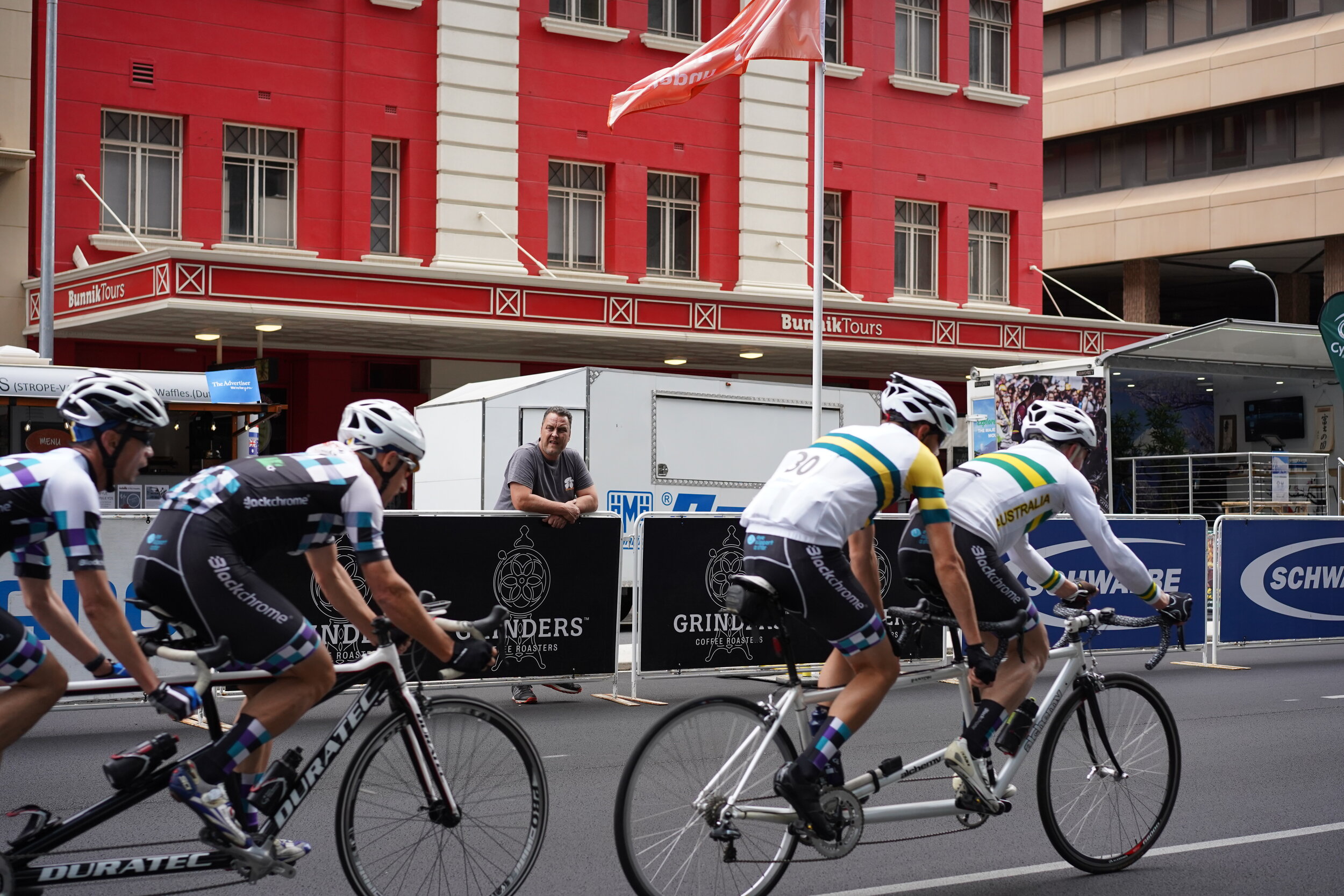Wheels boosts Adelaide Hills coffee businesses a month after the bushfires
The 2019 Santos Tour Down Under, with its status as part of the Union Cycliste International (UCI) world cycling circuit, has built extraordinary economic benefits. It attracts visitors who travel specifically to South Australia for the event and enhances South Australia’s world profile.
2020 Santos Tour Down Under is underway, Credit Nicole Motteux ©2020
“Persons with disabilities have a significant positive impact on society, and their contributions can be even greater if we remove barriers to their participation. With more than one billion of persons with disabilities in our world today, this is more important than ever.”
And 2020 wheels are bringing hope and commerce back to bushfire-affected areas of the Adelaide Hills, including filling cafes. The Santos Festival of Cycling is designed to link ‘wheels to ten days of entertainment and action on and off the bike.
Cycle race goes through fire-affected towns, Adelaide Hills, credit Nicole Motteux ©2020
Transforming Disabled Lives Through WheelPower
Yesterday I joined the action in the heart of the Adelaide CBD to take photographs - checking out the coffee scene and enjoying the top para-cyclists 30-minute sprint event. The paracyclist racing circuit was open to both female and male athletes.
Spectators grabbed a coffee from nearby cafes and mobile units while watching the paracyclist world champions.
Local café benefits from increased trade at the track, Adelaide, credit Nicole Motteux ©2020
The commentator noted that cycling is a relatively new sport for paralympians. Visually-impaired athletes compete on tandem bicycles. Cyclists with limb loss or deficiency, spinal cord or nerve damage, cerebral palsy or acquired brain injury used bicycles modified for their needs.
Equipment development powers elite riders in cycling and racing, Credit Nicole Motteux ©2020
The next event for the cyclist will be the Tokyo 2020 Paralympic Games. Watching the Tour Down Under, I was able to glimpse the para-cyclists putting in the final race training in their pursuit of gold.
Preparation for the sixteenth Summer Paralympics in Tokyo 2020, Credit Nicole Motteux ©2020
The strength, talent, and dedication of the athletes prompted me to read some of their stories. Christian Ashby was chronically injured when knocked off his bike in Melbourne. To get to this race meant overcoming adversity, accepting change, finding courage and battling to gain social inclusion. This ethos of courage, determination, and equality is shared by Carol Lynn Cooke who spoke live yesterday before the start of the race. In 2019, Cooke was awarded Cycling Australia's Para Female Road Cyclist of the Year.
Tour Down Under strongly advocates for improved road safety to prevent road injuries and fatalities, Credit Nicole Motteux ©2020
I was thrilled by the inclusion of para cyclists in the Santos Tour Down Under and that Grinder Coffee Roasters is a major partner of the iconic cycling event.
Tour Down Under partnership with Grinders Coffee Roasters, Credit Nicole Motteux ©2020
Although spectator turnout for this particular event was disappointing, it is heartening to know that Article 30 of the Convention on the Rights of Persons with Disabilities, which highlights the importance of all forms of sport for disabled people, received the highest number of signatories in history to a UN Convention on its opening day.
But what research shows is that the growth of para-cycling at the elite level has not “trickled down” to encouraging more people with disabilities becoming active. This is mainly due to barriers such as the high costs for equipment and transportation, a lack of specialised coaches and information regarding the sporting opportunities that do exist.
Cycling has many health, social, economic and environmental benefits, Credit Nicole Motteux ©2020
Time to transform café for all
From elite to recreational level sport, para-cycling is important for improving quality of life, self-esteem, and independence, providing opportunities for recreation. It gets people out and socialising, with the added incentive of enjoying a coffee too.
Coffee and cycling have had a long relationship, credit Nicole Motteux ©2020
Living with a disability is nothing compared to living with exclusion.” – Stella Young
Persons with disabilities often face societal and physical barriers resulting in many people with disabilities becoming excluded from education, employment and community.
Alongside sport, cafes play an important role to prevent social exclusion and help increase psychological wellbeing for people with disability.
Perhaps a priority for the coffee industry is to see how to make it easier for people with disabilities to access their local café, ensuring all have every opportunity to be a member of the community and enhancing psychological well-being for all of us.
Here are 5 ways to make your business inclusive of people with disability
1. Accessibility
2. Service principles
3. Training
4. Employment of people with disability
5. Non-property related inclusions
2020 Tour Down Under boosts Adelaide Hills morale, credit Nicole Motteux ©2020
McLaren Vale - Willunga Hill, final stage, Credit Nicole Motteux ©2020
About the author: Nicole Motteux is a sustainable coffee advocate based in Adelaide, Australia. She works with businesses, NGOs and government agencies to develop sustainable linkages across the coffee supply chain and support equality in the industry. Nicole regularly publishes coffee articles, is a keynote speaker, photographer and development specialist. Learn more about Nicole or get in touch - she’d love to have a coffee.










